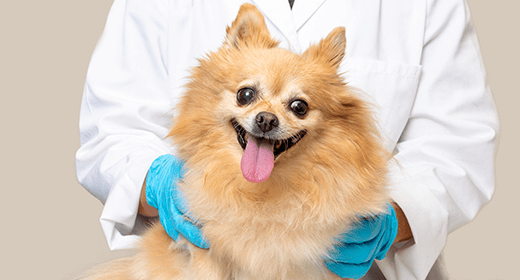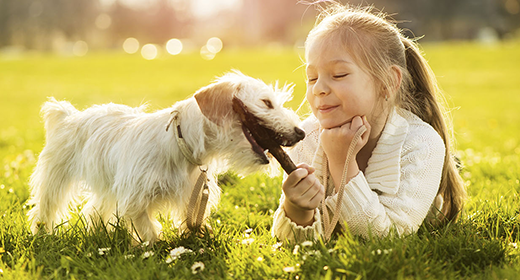

By now we all know obesity is unhealthy—for both people and pets. But do you know just how many health problems it can cause for your dog? Diabetes, bone and joint damage, decreased liver function, heart disease, increased blood pressure, and a heightened risk of cancer are just a few of the serious health issues caused by obesity. That’s a scary list. Protect your pooch by taking a proactive approach to keeping the pounds off. Here are some ways to do it.
Dogs do better with a controlled amount of food on a schedule. While some dogs can handle eating from an always-full and ever-present dog bowl, most will overeat if food is always available.
There are lots of dog foods out there, all offering something different. When it comes to keeping obesity in check, IAMS™ ProActive Health™ Adult Weight Control and IAMS Healthy Naturals™ Weight Management with Chicken formulas are great choices.
Your dog’s your pal, so it’s difficult not to share your tasty bacon or a bite of steak with him when he gives you those big, pleading eyes. But trust us—it’s worth it to resist. Feeding Fido “people food” ups his food and fat intake significantly. Plus, it creates bad habits: A dog that’s not fed from the table won’t learn to beg.
Obviously, a great way to keep your dog trim and fit is with some good exercise sessions. When you don’t have a lot of time, do short sessions of fetch or tug-of-war. Take it to the next level by jogging with your dog, tossing the Frisbee®, or starting agility training. And here’s a bonus: A dog that gets enough exercise is less likely to act out.
Of course you want to reward your dog when he’s good—but don’t forget that those treats can add up. Pay attention to the calorie and fat content of the treats you give. More importantly, take note of how many goodies you’re doling out—and how often.
Most of the time, a dog is overweight because he’s taking in more calories than he’s burning. But it is possible that there is a larger problem at work. If you’ve tried maintaining your dog’s diet and increasing exercise and still aren’t seeing results, talk to your veterinarian about a possible thyroid or other metabolic disorder.
Don’t get discouraged if you slip up every once in a while or don’t see results right away. Battling obesity is done day to day—it’s about forming good habits and being disciplined. By following the tips above and showing a little dedication, you’ll be on your way to having a healthier, happier dog.


Antioxidants are nutrients found naturally in the body and in plants such as fruits and vegetables. Common antioxidants include vitamin A, vitamin C, vitamin E, and certain compounds called carotenoids (like lutein and beta-carotene).
As cells function normally in the body, they produce damaged molecules called free radicals. These free radicals are highly unstable and steal components from other cellular molecules, such as fat, protein, or DNA, thereby spreading the damage.
This damage continues in a chain reaction, and entire cells soon become damaged and die. This process is called peroxidation. Peroxidation is useful because it helps the body destroy cells that have outlived their usefulness and kills germs and parasites. However, peroxidation, when left unchecked, also destroys or damages healthy cells.
Antioxidants help prevent widespread cellular destruction by stabilizing free radicals. More important, antioxidants return to the surface of the cell to stabilize, rather than damage, other cellular components.
When there are not enough antioxidants to keep peroxidation in check, free radicals begin damaging healthy cells, which, in turn, can lead to problems. For example, free-radical damage to cells of the immune system can lead to an increased risk of infections.
Because antioxidants play a key role in minimizing damage to human cells, such as those that make up the immune system, research examined the benefits of certain antioxidants on the immune response of dogs. The results of these studies indicated that antioxidants are important in helping dogs maintain a healthy immune system.